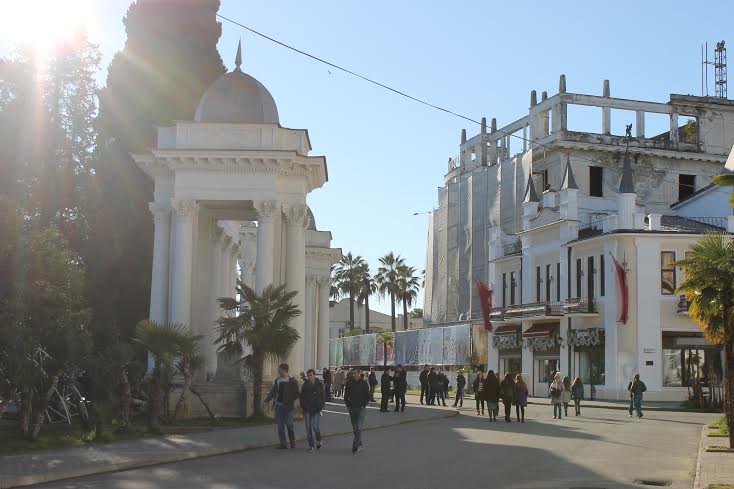Demographic Concerns and Controversy Surrounding Abkhazia’s “Apartment Law”
What happened?
Raul Khajimba, the former de-facto leader of Abkhazia, voiced staunch opposition to the proposed “apartment law” on July 18. Expressing concerns about the proposed legislation, Khajimba warned: “History could repeat itself. Regardless of how enticing the narrative, the influx of people purchasing these apartments could significantly shape political processes. Any assurances to the contrary are false.”
What is the “Apartment Law”?
Until now, foreigners have had no right to buy residential real estate, but the new “law on apartments”, if adopted, will allow this ban to be circumvented. On February 3, the “cabinet of ministers” of occupied Abkhazia published a controversial draft law titled “On the Regulation of the Legal Status of Aparthotels and Apartments.” Proposed by the current de-facto leader of Abkhazia Aslan Bzhania, the bill aims to address the lack of legislative regulation in Abkhazia concerning temporary accommodation facilities, particularly apartments.
The draft law defines apartments as commercial premises that can be privately owned by individuals and legal entities, but with restrictions on their use limited to temporary stays for personal or profit-making purposes through compensated accommodation. The law addresses public utility costs, taxes, fees, and migration registration for foreigners, while imposing restrictions on foreign ownership, which will be limited to those who “respect Abkhazia’s sovereignty,” with “individuals involved in hostilities or crimes against Abkhaz citizens disqualified.” Furthermore, foreign owners will not be eligible for residence permits or citizenship. With the law, the de-facto “government” seeks to attract investments, increase revenues, and provide housing solutions for Abkhaz citizens through new taxes.
Why is the law controversial for Abkhazians?
The law’s opponents argue that despite not granting direct citizenship, there are loopholes for apartment owners to obtain an Abkhazian passport if they stay permanently in the occupied region, which could upset the demographic balance. They point to historical evidence, citing similarities to the migration process in 1939-1959 that brought ethnic Georgian collective farmers and families from other parts of western Georgia to Abkhazia. This “led to significant demographic changes within the native Abkhazian population,” which, in the opponent’s view, substantiates their concerns about the potential impact of the new law.
Inal Khashig, a known local journalist, says, “The ban on the sale of residential real estate to foreigners is one of the most painful topics regularly discussed in society” as the Abkhaz fear “to find themselves in the minority in their homeland.” But despite the ban, housing is still being sold to foreigners, mainly Russians, illegally.
Khashig notes that “from time to time, the Kremlin transparently hints to the Abkhazian government that the ban should be lifted. Until now, this has not happened, but the wind appears to be changing.”
He points out that the opposition to the current de-facto leadership has also raised other concerns about the proposed law, in addition to the possible upsetting of the “demographic balance”:
- Due to the prevailing corruption, valuable lands, including conservation areas, may be used for apartment construction.
- Housing prices are expected to surge, making it unaffordable for many citizens.
- The sale of apartments could negatively affect the occupancy of hotels and guest houses, impacting small and medium-sized tourism businesses.
- Local construction companies may struggle to compete with foreign [Russian] firms, which could receive tax incentives from the Abkhaz “authorities.”
What has been the recent reaction to the draft law?
The majority of the Abkhazians strongly oppose the draft law. On June 30, public figures led by Levan Mikaa, Chairman of the so-called “Committee for the Protection of the Sovereignty of Abkhazia,” established a public council to counter the bill. On May 30, the Abkhaz opposition held a “people’s rally” to protest the “apartment law.” On May 5, young protestors were detained by the police in Sokhumi during a similar protest.
The protests renewed recently.
- The Diaspora Abkhaz People’s Initiative, an organization in Turkey, issued a statement on July 13, urging Abkhaz people and supporters to unite in safeguarding Abkhazia’s future, opposing the “apartment law” that they believe endangers national sovereignty, cultural heritage, and demographic balance.
- The veteran civil organization “Aruaa” strongly opposes the proposed apartment law, expressing grave concerns about its “potential threat to national security and ethno-political equilibrium in Abkhazia.” They assert that passing the law could undermine the sacrifices of the “national liberation struggle” and render the “efforts of the Abkhaz for self-determination meaningless.”
- On July 17, the Federation of Caucasian Associations (KAFFED) expressed serious concerns about the proposed “apartment law” in Abkhazia.
What is the reaction of the de-facto leadership?
Despite the growing opposition, on July 12, the de-facto leader of the occupied region, Aslan Bzhania, instructed the “parliament” to swiftly adopt a controversial law on apartments, which some deputies saw as an attempt to exert undue pressure on the legislature.
Meanwhile, on July 18, the head of “government” Alexander Ankvab, dismissed the concerns about the impact of apartment hotels, saying the opponents should instead focus on “the real demographic threats” faced by Abkhazia, including disease, like COVID-19, and fatalities on the roads. He presented statistics on birth and death rates to counter arguments linking population dynamics to tourism and hotels, emphasizing that the country’s demographic challenges are elsewhere.
This post is also available in: ქართული Русский
